Term Page
Citizenship and Naturalization 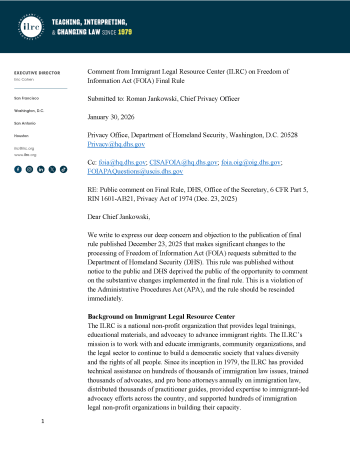
ILRC submitted this comment to DHS opposing recent changes to FOIA rules effective January 22, 2026 that restrict public access. DHS published a final rule in violation of the Administrative Procedures Act by unlawfully bypassing public notice and comment. The rule eliminates paper filing of FOIA requests and allows DHS in its discretion to administratively close requests that it deems to insufficiently describe the records sought.
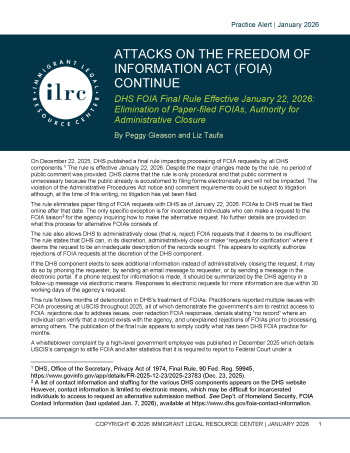
On December 22, 2025, DHS published a final rule impacting processing of FOIA requests by all DHS components. The rule is effective January 22, 2026. Despite the major changes made by the rule, no period of public comment was provided. The rule eliminates paper filing of FOIA requests with DHS as of January 22, 2026. FOIAs to DHS must be filed online after that date. The rule also states that DHS can, in its discretion, administratively close or make “requests for clarification” where it deems the request to be an inadequate description of the records sought.
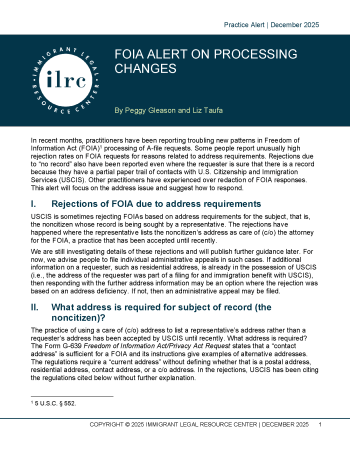
In recent months, practitioners have been reporting troubling new patterns in FOIA processing of A-file requests. Some people report unusually high rejection rates on Freedom of Information Act (FOIA) requests for reasons related to address requirements. Rejections due to “no record” also have been reported even where the requester is sure that there is a record because they have a partial paper trail of contacts with USCIS. Frequent over redaction of FOIA responses also has been reported. This alert discusses the address issue and suggests how to respond.
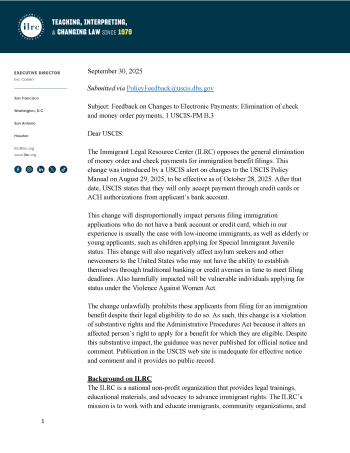
The Immigrant Legal Resource Center (ILRC) opposes the general elimination of money order and check payments for immigration benefit filings. This change was introduced by a USCIS alert on changes to the USCIS Policy Manual on August 29, 2025, to be effective as of October 28, 2025. The new guidance states that all applications filed October 28, 2025, or after must pay by ACH bank account payment, credit or debit card, or pre-paid card. No bank checks, certified checks, personal checks or money orders will be accepted thereafter.
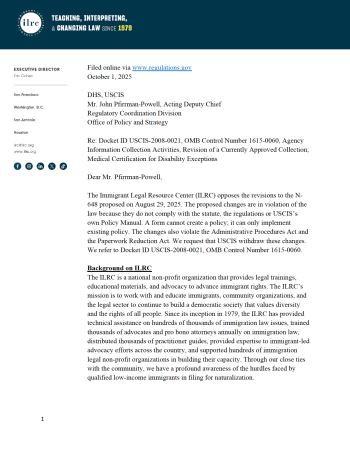
On September 30, 2025, ILRC submitted this comment to USCIS to oppose the proposed changes to the N-648 and request that they be withdrawn. The changes create a series of substantial obstacles for naturalization applicants applying for a disability waiver of the English/civics requirement. The proposed changes create a form more than twice the length (10 pp.) of the current form (just over 4 pp.) that creates an undue burden on applicants and the medical professional who must complete the N-648. It also doubles the burden of time for USCIS adjudicators who must review this form.
The barrier that these changes would pose is prejudicial to eligible waiver applicants. Standards expressed in the revised form are outside any guidance provided by the statute, regulations and USCIS Policy Manual. The form purports to create law and invents barriers to eligibility in areas where no such law has been established by legitimate guidance.
The barrier that these changes would pose is prejudicial to eligible waiver applicants. Standards expressed in the revised form are outside any guidance provided by the statute, regulations and USCIS Policy Manual. The form purports to create law and invents barriers to eligibility in areas where no such law has been established by legitimate guidance.
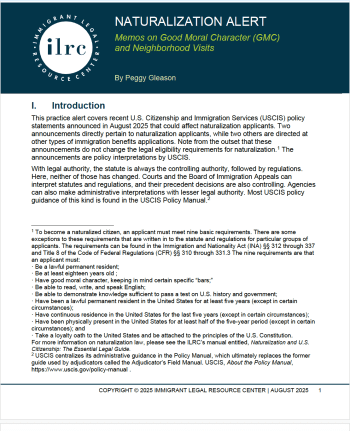
This practice alert covers recent U.S. Citizenship and Immigration Services (USCIS) policy statements announced in August 2025 that could affect naturalization applicants.
On July 28, 2025, the ILRC submitted a comment opposing a new government proposal to add extra questions to nine immigration forms, including applications for naturalization, asylum, and green cards.
On July 16, 2025, ILRC submitted a comment opposing a new U.S. Citizenship and Immigration Services (USCIS) policy that allows the agency to use “derogatory information” against immigration applicants without always disclosing it.
On May 2, 2025 the ILRC submitted a letter signed by 115 organizations has opposing a U.S. Citizenship and Immigration Services (USCIS) proposed rule to expand the information collected on immigration forms.
On May 2, 2025 the ILRC submitted a comment opposing a proposed U.S. Citizenship and Immigration Services (USCIS) rule that would expand the collection of personal information from immigration applicants.